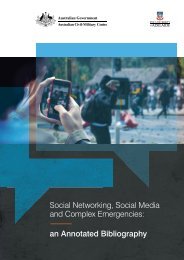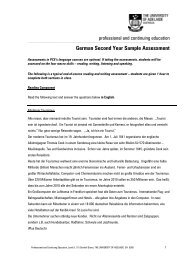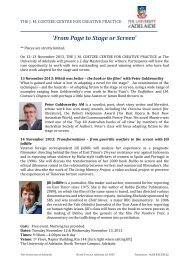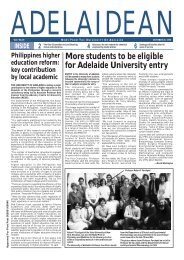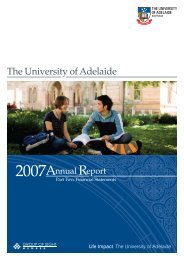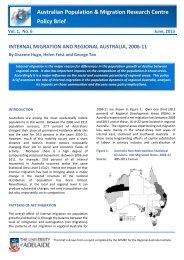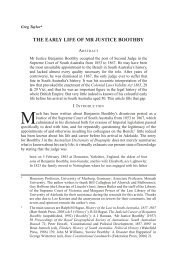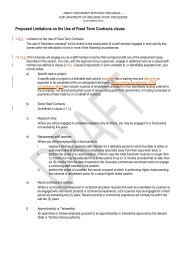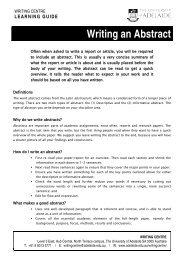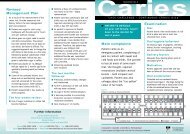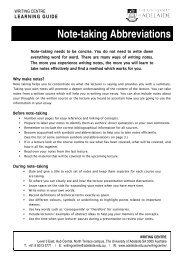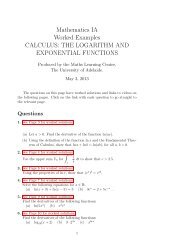Unbridling the Tongues of Women - The University of Adelaide
Unbridling the Tongues of Women - The University of Adelaide
Unbridling the Tongues of Women - The University of Adelaide
Create successful ePaper yourself
Turn your PDF publications into a flip-book with our unique Google optimized e-Paper software.
Prophet <strong>of</strong> <strong>the</strong> effective vote<br />
upon my soul that in <strong>the</strong> co-operative spirit and <strong>the</strong> co-operative method applied to<br />
politics instead <strong>of</strong> <strong>the</strong> competitive, we may find deliverance from many evils that are<br />
eating into <strong>the</strong> heart and lessening <strong>the</strong> happiness <strong>of</strong> humanity’. 57<br />
Yet for all its appearance <strong>of</strong> moderation and eclecticism, effective voting would<br />
ensure to each <strong>of</strong> <strong>the</strong> major political opponents accurate representation <strong>of</strong> its relative<br />
strength. That meant, automatically, greater representation for labour. Co-operation<br />
was a cry likely to win her support from all but out-and-out reactionaries. One<br />
<strong>of</strong> her first invitations to speak publicly in <strong>Adelaide</strong> came from <strong>the</strong> <strong>Adelaide</strong> Cooperative<br />
Society, a body <strong>of</strong> share-holders in a non-political, moderately pr<strong>of</strong>itable<br />
venture in co-operative farming. 58 Spence insisted on her independence from any<br />
political group or party, but her appeal for co-operation was made, not on behalf<br />
<strong>of</strong> moderate conservatives, but in <strong>the</strong> spirit <strong>of</strong> <strong>the</strong> Reform Movement. She had already<br />
demonstrated her support for Henry George’s single tax, and her readiness at<br />
least to domesticate ideas like Bellamy’s. Her belief in <strong>the</strong> elevated social and moral<br />
order which effective voting would bring was identical with <strong>the</strong> Utopianism <strong>of</strong> <strong>the</strong><br />
reformers. <strong>The</strong> Reform Movement made her cause part <strong>of</strong> <strong>the</strong>ir own, supplied her<br />
most vocal supporters, and publicised her activities. In June 1893, papers on ‘Effective<br />
Voting’ and ‘New Australia’ were read from <strong>the</strong> same platform. 59 As late as April<br />
1896, Elsie Birks was writing to a friend about ‘ “Pr<strong>of</strong>essor” Gilmour’ and his lecture<br />
on effective voting in Renmark. ‘Does not Miss Spence speak well and clearly’, she<br />
exclaimed, ‘she is indeed a wonderful woman’. 60<br />
Spence made no original contribution to ways <strong>of</strong> calculating <strong>the</strong> quota for proportional<br />
representation, that is <strong>the</strong> smallest number <strong>of</strong> votes necessary to elect a<br />
candidate. In 1861 she described only Hare’s quota, calculated by dividing <strong>the</strong> number<br />
<strong>of</strong> formal votes to be cast by <strong>the</strong> number <strong>of</strong> seats to be filled. But by 1892 she<br />
had adopted ‘Sir John Lubbock’s ma<strong>the</strong>matical quota’, devised in 1868 by H. R.<br />
Droop and adopted by Lubbock, a leading member <strong>of</strong> <strong>the</strong> British Proportional Representation<br />
Society. 61 <strong>The</strong> Droop quota, calculated by dividing <strong>the</strong> total formal votes<br />
cast by <strong>the</strong> number <strong>of</strong> seats to be filled plus one, and adding one to <strong>the</strong> quotient,<br />
was supposed to prevent parties achieving majority returns, where <strong>the</strong> Hare quota<br />
only hampered such a result. 62 In 1893, Spence decided, mistakenly, that <strong>the</strong> Droop<br />
quota left even more <strong>of</strong> <strong>the</strong> votes unused, and returned to <strong>the</strong> simple Hare quota. It<br />
was, in any case, easier to understand: ‘popular audiences prefer <strong>the</strong> simple quota <strong>of</strong><br />
Thomas Hare’s’, she noted a year later. 63<br />
133



